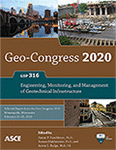Geo-Congress 2020
Full and Quasi-Stochastic Slope Stability Analyses Using Random Limit Equilibrium Method (RLEM)
Publication: Geo-Congress 2020: Engineering, Monitoring, and Management of Geotechnical Infrastructure (GSP 316)
ABSTRACT
Natural alluvial deposits exhibit variability in strength and stiffness parameters which results in uncertainty in the response of geotechnical structures such as slopes. Random limit equilibrium method (RLEM) offers a conceptually simple, versatile, and efficient approach for the evaluation of the stability conditions of heterogeneous slopes. Limit equilibrium methods (LEM) using non-circular slip geometries have proven more accurate than circular slip geometries in profiling the failure status of heterogeneous slopes by passing through the weak points more effectively. Findings of the current study support the non-circular RLEM approach over the conventional circular slice-based formulations. It is also shown that adopting a very simple and computationally efficient quasi-stochastic RLEM approach, which is based on the block search method, will render fairly accurate predictions of the stability conditions of nonhomogeneous slopes in comparison to the inaccurate 1D approach. Furthermore, it is shown that considering correlation in the shear strength parameters is very important when evaluating the stability of heterogeneous slopes.
Get full access to this article
View all available purchase options and get full access to this chapter.
REFERENCES
Cami, B., Javankhoshdel, S., Lam, J., Bathurst, R. J., & Yacoub, T. (2017). Probabilistic Analysis of a Tailings Dam using 2D Composite Circular and Non-Circular Deterministic Analysis, SRV Approach, and RLEM. In Proceedings of 70th Canadian Geotechnical Conference, Ottawa, Canada, September 2017.
Cami, B., Javankhoshdel, S., Bathurst, R. J., & Yacoub, T. (2018). Influence of mesh size, number of slices, and number of simulations in probabilistic analysis of slopes considering 2D spatial variability of soil properties. In IFCEE 2018 (pp. 186-196).
Gandomi, A. H., Kashani, A. R., Mousavi, M., & Jalalvandi, M. (2017). Slope stability analysis using evolutionary optimization techniques. International Journal for Numerical and Analytical Methods in Geomechanics, 41(2), 251-264.
Jamshidi Chenari, R., & Alaie, R. (2012). Effect of the Heterogeneity of Undrained Shear Strength on the Stability of Natural Slopes. Sharif Journal of Science and Research, 29 (2), 13-22.
Jamshidi Chenari, R., Kamyab Farahbakhsh, H., & Zamanzadeh, M. (2015). Investigation into the Effect of the Inherent Heterogeneity of Soil on the Long-Term Stability of Earth Slopes. Sharif Journal of Science and Research, 31.2 (3.1), 3-17.
Jamshidi Chenari, R., & Alaie, R. (2015). Effects of anisotropy in correlation structure on the stability of an undrained clay slope. Georisk: Assessment and Management of Risk for Engineered Systems and Geohazards, 9(2), 109-123.
Jamshidi Chenari, R., & Zamanzadeh, M. (2016). Uncertainty assessment of critical excavation depth of vertical unsupported cuts in undrained clay using random field theorem. Scientia Iranica. Transaction A, Civil Engineering, 23(3), 864.
Jamshidi Chenari, R., Kamyab Farahbakhsh, H., & Izadi, A. (2019). Continuous Slip Surface Method for Stability Analysis of Heterogeneous Vertical Trenches. Scientia Iranica, https://doi.org/10.24200/SCI.2019.21227.
Jamshidi Chenari, R., & Izadi, A. (2019). Discussion of “An analytical probabilistic analysis of slopes based on limit equilibrium methods” by A. Johari, S. Mousavi. November 2018. Bulletin of Engineering Geology and the Environment, 1-5.
Javankhoshdel, S., & Bathurst, R. J. (2014). Simplified probabilistic slope stability design charts for cohesive and cohesive-frictional (c-ϕ) soils. Canadian Geotechnical Journal, 51(9), 1033-1045.
Javankhoshdel, S., & Bathurst, R. J. (2015). Influence of cross correlation between soil parameters on probability of failure of simple cohesive and c-ϕ slopes. Canadian Geotechnical Journal, 53(5), 839-853.
Javankhoshdel, S., Luo, N., & Bathurst, R. J. (2017). Probabilistic analysis of simple slopes with cohesive soil strength using RLEM and RFEM. Georisk: Assessment and Management of Risk for Engineered Systems and Geohazards, 11(3), 231-246.
Javankhoshdel, S., Cami, B., Bathurst, R. J., Yacoub, T. & Corkum, B. (2017). Probabilistic analysis of cohesive-frictional slopes using the RLEM (circular and con-circular) and the RFEM. In Proceedings of 70th Canadian Geotechnical Conference, Ottawa, Canada, September 2017.
Javankhoshdel, S., Cami, B., Mafi, R., Yacoub, T., & Bathurst, R. J. (2018a). Optimization Techniques in Non-circular Probabilistic Slope Stability Analysis Considering Spatial Variability. In GeoEdmonton 2018, Edmonton, AB, Canada, September 2018.
Javankhoshdel, S., Cami, B., Bathurst, R. J., & Corkum, B. (2018b). Probabilistic analysis of layered slopes with linearly increasing cohesive strength and 2D spatial variability of soil strength parameters using non-circular RLEM approach. In IFCEE 2018 (pp. 133-142).
Johari, A., & Mousavi, S. (2018). An analytical probabilistic analysis of slopes based on limit equilibrium methods. Bulletin of Engineering Geology and the Environment, 1-15.
Luo, N., Bathurst, R. J., & Javankhoshdel, S. (2016). Probabilistic stability analysis of simple reinforced slopes by finite element method. Computers and Geotechnics, 77, 45-55.
Rocscience Inc. 2018. Slide Version 2018–2D Limit Equilibrium Slope Stability Analysis. www.rocscience.com, Toronto, Ontario, Canada.
Tabarroki, M., Ahmad, F., Banaki, R., Jha, S. K., & Ching, J. (2013). Determining the factors of safety of spatially variable slopes modeled by random fields. Journal of Geotechnical and Geoenvironmental Engineering, 139(12), 2082-2095.
Information & Authors
Information
Published In
Geo-Congress 2020: Engineering, Monitoring, and Management of Geotechnical Infrastructure (GSP 316)
Pages: 667 - 676
Editors: James P. Hambleton, Ph.D., Northwestern University, Roman Makhnenko, Ph.D., University of Illinois at Urbana-Champaign, and Aaron S. Budge, Ph.D., Minnesota State University, Mankato
ISBN (Online): 978-0-7844-8279-7
Copyright
© 2020 American Society of Civil Engineers.
History
Published online: Feb 21, 2020
Published in print: Feb 21, 2020
ASCE Technical Topics:
- Analysis (by type)
- Chemical properties
- Chemistry
- Design (by type)
- Disaster risk management
- Engineering fundamentals
- Engineering mechanics
- Environmental engineering
- Equilibrium
- Geomechanics
- Geometrics
- Geotechnical engineering
- Heterogeneity
- Highway and road design
- Limit analysis
- Limit equilibrium
- Material mechanics
- Material properties
- Materials engineering
- Mathematics
- Parameters (statistics)
- Risk management
- Shear strength
- Slope stability
- Slopes
- Statics (mechanics)
- Statistics
- Strength of materials
Authors
Metrics & Citations
Metrics
Citations
Download citation
If you have the appropriate software installed, you can download article citation data to the citation manager of your choice. Simply select your manager software from the list below and click Download.
